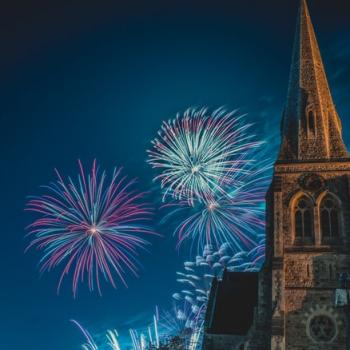Guest Post: by Jordan Blevins Bles
The table is always expanding – making room for more people, and wider diversity. I like to think of it as revealing more of the table at which God sits. However, it is a long, slow reveal. Those of us who already have seats at the table tend to get in the way at times. We like to protect our table at the expense of joining God’s. I am a white, straight man. It is time to name the ways in which I, and my fellow straight, while men, are part of the problem. And the protection of our privilege is THE problem.
If I remember correctly, it was early middle school when I was first asked to be a speaker during a youth Sunday at my home congregation, the Westminster Church of the Brethren. It was after that I first heard the phrase, “You have such a great speaking voice!”
I am not saying it isn’t true. I happen to think my voice is delightful! But I also know now, that the quality of my voice isn’t actually what they mean. I know a number of women who almost never hear that phrase. Or, if they do, it comes accompanied by surprise – “I could hear every word that you said!”. When folks complement my speaking voice, what they tend to mean is that I have the kind of voice they expect to hear from a pulpit. A man’s voice.
During my time with the Young Adult Ecumenical Movement, I was a co-chair with an African American man. For 2 or 3 years, we gave joint presentations to a national ecumenical body. Serving in that role brought about some amazing relationships with denominational leaders who I treasure as mentors. While I have been out of those professional circles for almost 5 years, my colleague has stayed connected to that world, and recently following his presentation heard the queries of “Where did he come from?” as if he just appeared. He heard remarks about how well spoken he was, and where he “came from.” It struck me how invisible he was beside me as a young, black man standing at the microphone. At the table of this world, my presence is one that is always visible, and always welcome.

My third story comes from a denominational gathering this past winter, where we were having a conversation about inclusion of LGBTQ persons within the church – in a room that had a diverse range of perspectives on the issue (it was the only way the room was diverse, but I digress…). I heard a statement I have heard many times before, along the lines of, “this issue is keeping us from doing the important work of the church”. I have never had to wonder whether or not the church considered the value of my person as unimportant to the work of the church.
At every phase of my life, my voice has been one that has not only been asked for, but has been heard. Along the way, I have never had any doubt that this would be true. I have never had any doubt that the fullness of my person would be valued by society or by the church. My partner, Robyn, is an incredibly gifted minister. An amazing mother, a kind spirit, a beautiful woman. Yet, she often has to justify preaching while female. She has to write articles about running while female. She has to carefully chose her outfits or hairstyles so that they don’t become the focus of what she is doing.
I am acutely aware of my privilege – probably moreso now than I ever have been. It is an awareness that continues to grow: as a young, white man gets a light sentence for raping a young woman; as Donald Trump questions a judge’s ability based on ethnicity; as LGBTQ people of color are gunned down for being who they are.
The challenge isn’t how to “lose” my privilege, or how to make it go away. I can’t take off my whiteness, my maleness, my straightness. But as a straight, white man, I have to be part of the solution to the problem that is me. And that means learning to be an ally in the midst of my privilege. It means being willing to join everyone else– not at the table of this world, but at God’s table.
Being an ally means that when you have the blessing of being in a diverse room, you learn to shut up and listen. It means being 100% ok with the fact that your idea and your voice isn’t leading the room and the conversation – no matter how good you think they are or how good they might actually be!
It means, when you find yourself in a room when you are in the decided majority, being the one to point that out. Whether that lack of diversity is one of race, gender, sexual orientation, that you don’t expect the minority voices in the room to bring that up.
It means you aren’t in charge by default. It means allowing the space for others to lead, even if it means you don’t get to. It might mean you don’t get that job, that chance to be a speaker or presenter, that leadership position. And the reason someone else got it isn’t because they are NOT straight, white and male. But because they are just as qualified for it as you are.
It means letting go of the assumption that your straight, white maleness is the norm by which the world measures value. That everything else isn’t deviated from who YOU are. It’s understanding that everyone else’s humanity is of equal value on its own, without deriving value from your recognition of it.
For too long, straight white men have been allowed to assume that we would be leaders; that our voices would be heard; that the justice system would give us the benefit of the doubt. We don’t have to worry about our physical safety just because we are walking down the street, into the bathroom, or to our cars. Our mistakes don’t damn an entire population of people, and our inclusion does not depend upon who we love…
The question isn’t whether or not women’s voices should be heard. Or, whether the justice system should be fair to a young, black male. Or, whether GLBTQ persons should be included in our society and our church. The question is whether we, as white, straight men will kick and fight to protect our privilege at the expense of everyone else; or, whether we are willing to leave “our” table, and join everyone else at God’s table.












